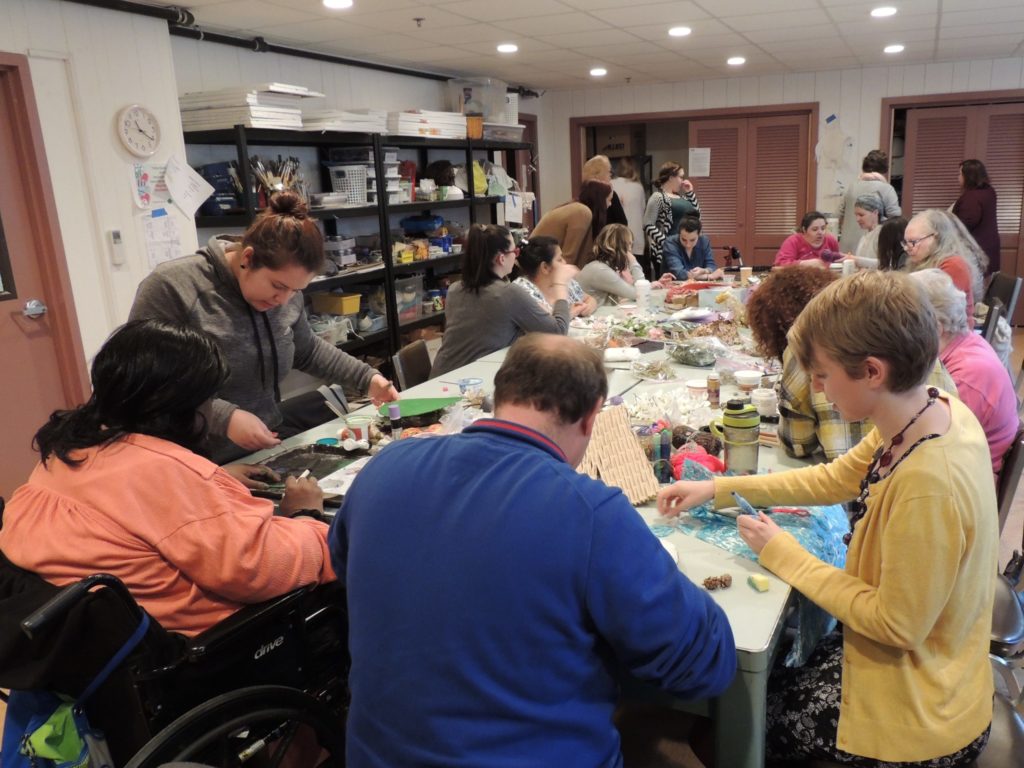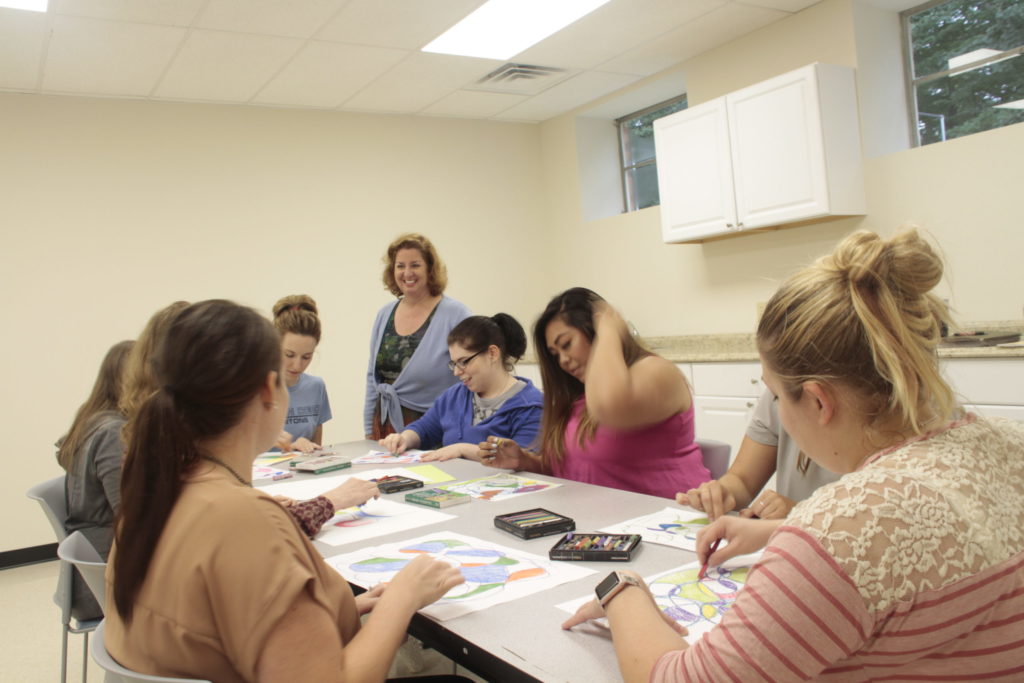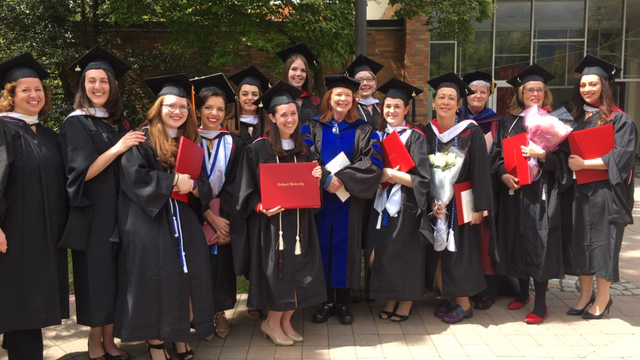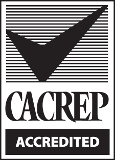M.A. in Clinical Mental Health Counseling with Art Therapy Specialization
REGISTER FOR THE APRIL 14 CONFERENCE:
Becoming a Shapeshifter: Exploring our Ecological Identities
April 14, 2024 | Register Here
The Master’s in Clinical Mental Health Counseling degree with art therapy specialization is a uniquely designed 63-credit program that prepares you for a career as a clinical mental health counselor with specialization in art therapy in a variety of human service settings.
The program is accredited by the Council for Accreditation of Counseling and Related Educational Program (CACREP) and the Commission on Accreditation of Allied Health Education Programs (CAAHEP). The degree fulfills coursework requirements for licensure in New Jersey as a Licensed Professional Counselor (LPC). The Master’s in Clinical Mental Health Counseling degree with art therapy specialization also fulfills coursework requirements for New Jersey State licensure as a Professional Art Therapist (LPAT).
Graduate coursework is a combination of didactic and experiential teaching methods in cognitive (knowledge), psychomotor (skills), and affective (behavior and professional dispositions) learning domains. The program requires that students complete coursework, practicum, and internship experiences, and pass a comprehensive examination.
Counseling Art Therapy | Community Treatment Services
The Mary Jo Rolli Codey ’77 Center
The Mary Jo Rolli Codey Center is located on the Caldwell University campus. The center provides mental health counseling with art therapy specialization services to adults in our local community while serving as a training facility for our academic programs. Members of the local community can access treatment for personal growth or for mental health conditions in group and individual formats. Services to the local community are provided by credentialed counselors with art therapy specializations and advanced master’s students under the supervision of program faculty.
M.A. IN COUNSELING WITH MENTAL HEALTH COUNSELING ART THERAPY SPECIALIZATION – CACREP-ACCREDITED; CAAHEP-ACCREDITED
The Master’s in Clinical Mental Health Counseling degree with art therapy specialization is a uniquely designed 63-credit program that prepares you for a career as a clinical mental health Counselor with specialization in art therapy in a variety of human service settings.
The Master’s in Clinical Mental Health Counseling degree is accredited by the Council for Accreditation of Counseling and Related Educational Program (CACREP) and the Commission on Accreditation of Allied Health Education Programs (CAAHEP). The degree fulfills coursework requirements for licensure in New Jersey as a Licensed Professional Counselor (LPC) and integrates the CACREP Standards for Clinical Mental Health Counselors. The Master’s in Clinical Mental Health Counseling degree with art therapy specialization also fulfills coursework requirements for registration as an art therapist (ATR) with the Art Therapy Credentials Board (ATCB) and licensure as a Professional Art Therapist (LPAT) in NJ.
Graduate coursework is a combination of didactic and experiential teaching methods in cognitive (knowledge), psychomotor (skills), and affective (behavior and professional dispositions) learning domains. The program requires that students complete coursework, practicum and internship experiences, and pass a written and oral comprehensive examination.
A central component of Caldwell University’s counseling programs is the integration of spirituality throughout their coursework. In this context, students are prepared to competently consider the many aspects of the lives of their future clients.
ACADEMIC OPTIONS
M.A. in Counseling
- Clinical Mental Health Counseling Specialization
- Clinical Mental Health Counseling Art Therapy Specialization
- School Counseling Specialization
Combined B.A. in Psychology/M.A. in Counseling
Post-Graduate M.A. in Art Therapy
Post-Master Director of School Counseling
Post-Master Professional Counselor Licensing Credits
Post-Master School Counseling Specialization
ADMISSION REQUIREMENTS
Note – Admission to the M.A. in Counseling with Clinical Mental Health Counseling Specialization with Art Therapy Specialization are:
April 1 – Summer; June 1 – Fall; December 1 – Spring Semesters
- A completed application (on paper or online)
- A minimum undergraduate GPA of 3.2
- 6 credits in Psychology including Psychopathology and Human Development with at least a B in each. A course in psychology statistics is recommended
- 18 credits in studio art including drawing, painting, and three-dimensional work with at least a B in each
- Official undergraduate/graduate transcripts
- Writing sample: Submission of a paper of 5-10 pages that is formatted in APA style.
- Art portfolio of 10-15 pieces, slides, or digital copies evidencing proficiency in drawing, painting, three-dimensional work as well as a range of media
- Two letters of recommendation, preferably from former professors or current employer
- Personal and group interviews required
M.A. IN COUNSELING WITH MENTAL HEALTH COUNSELING ART THERAPY SPECIALIZATION – CACREP-ACCREDITED; CAAHEP-ACCREDITED
The Master’s in Clinical Mental Health Counseling degree with art therapy specialization is a uniquely designed 63-credit program that prepares you for a career as a clinical mental health Counselor with specialization in art therapy in a variety of human service settings.
The Master’s in Clinical Mental Health Counseling degree is accredited by the Council for Accreditation of Counseling and Related Educational Program (CACREP) and the Commission on Accreditation of Allied Health Education Programs (CAAHEP). The degree fulfills coursework requirements for licensure in New Jersey as a Licensed Professional Counselor (LPC) and integrates the CACREP Standards for Clinical Mental Health Counselors. The Master’s in Clinical Mental Health Counseling degree with art therapy specialization also fulfills coursework requirements for registration as an art therapist (ATR) with the Art Therapy Credentials Board (ATCB) and licensure as a Professional Art Therapist (LPAT) in NJ.
Graduate coursework is a combination of didactic and experiential teaching methods in cognitive (knowledge), psychomotor (skills), and affective (behavior and professional dispositions) learning domains. The program requires that students complete coursework, practicum and internship experiences, and pass a written and oral comprehensive examination.
In order to complete the Master’s program, students must demonstrate a professional presentation and aptitude and an ability to integrate theory and practice by successfully completing a supervised practicum experience, followed by an internship sequence.
The Academic Capstone of the program is a two-part comprehensive examination in the form of a case study supported by peer-reviewed research. The case study provides students with the opportunity to fully integrate counseling and art therapy perspectives into practice. Students should be able to demonstrate the following competencies on the comprehensive exam:
- An understanding of the fundamental principles of mental health counseling with art therapy specialization practice, including ethics, diagnosis, assessment, evidence-based treatment, individual and group process, human development, psychopathology, the role of culture, gender, family, career and lifestyle, spirituality, and the biopsychosocial bases of behavior;
- A recognition of how the creativity promotes wellness, healing and therapeutic change. A recognition of how client imagery, symbolism and metaphor communicate thoughts and feelings, challenges and strengths and support growth and well-being;
- An understanding of appropriate use of clinical mental health counseling and art-based assessments, interventions and media as applicable to the treatment process and treatment planning;
- Development of professional dispositions congruent with the profession.
- An understanding of research as a scholar practitioner.
- An ability to write clearly and to communicate effectively.
PROGRAM REQUIREMENTS (63 credits)
In order for students to initiate and continue their studies effectively and to satisfy all prerequisites as competent entry level Clinical Mental Health Counselors with art therapy specialization in the cognitive/knowledge, psychomotor/skills, and affective/professional dispositions/behavior learning domains, they should consult the Student Course Planning Guide within the Graduate Counseling Student Handbook. In addition, Program Coordinators can provide guidance and will establish advisement days each semester prior to registration.
Required Courses (48 credits)
Course Code : CPS 510
Course Description :
Focuses on the application of a systematic and empirical approach to the study of counseling Topics will include: scientific method, pseudoscience, types of experimental research, variable definition, validity threats, control strategies, experimental design, ethical issues, how to present research, statistical application, and additional material. Students engage in discussion, conduct relevant empirical research, and write research reports in the American Psychological Association format (APA).
Credit : 3
Course Code : CPS 520
Course Description :
An in-depth introduction to the history, roles, functions, and relationships of mental health counselors. Course content is set in the context of the ACA and AMHCA Codes of Ethics and counselors’ work is understood as well in the unique needs associated with culture, spirituality, gender, and other defining client characteristics. Emphasis is likewise given to the importance of counselor self-care. The course introduces the requirements of CACREP Core Standards and the Program Standards for Clinical Mental Health Counseling.
Credit : 3
Course Code : CPS 545
Course Description :
Examines the various legal constraints and ethical principles related to the roles, responsibilities and credentialing of counselors in private practice, agencies, schools, etc. In addition to emphasis on the ACA Code of Ethics, students learn to use the codes of ethics of their program specializations (AMHCA, ASCA, AATA) in order to become competent ethical decision-makers.
Credit : 3
Course Code : CPS 562
Course Description :
This course, designed for Mental Health Counseling and Art Therapy students features an overview of individual and group approaches to formal and informal modes of assessment employed by professional counselors. Course participants will evaluate instruments, practice interpreting results, and demonstrate knowledge of psychometric properties.
Credit : 3
Prerequisites :
CPS545, CPS520, CPS557
Course Code : CPS 577
Course Description :
This course is a study of abnormal psychological processes across the lifespan including behavior, etiology, symptomology, diagnosis, assessment, and treatment planning. Students are prepared to use the DSM-5 and other appraisal measures and tools for understanding client needs in varying settings.
Credit : 3
Prerequisites :
CPS557, CPS613, CPS667, CAT501, CPS667
Course Code : CPS 633
Course Description :
Undertakes the study of career development theories, career decision-making, career assessment, and occupational and labor market information, as well as basic strategies and instruments utilized by counselors in assisting individuals toward making appropriate career choices. Activities designed to assist clients at all developmental levels and in various settings provide students with practice in helping others in their career development and choices.
Credit : 3
Course Code : CPS 667
Course Description :
Using theory and research regarding human development from infancy through old age, the course examines the impact of life events, developmental factors, and abilities, and their implications for individuals, families, and for counselors and art therapists. While this broader scope provides the context for the course as a whole, a selective focus on childhood and adolescence is emphasized for students preparing to be school counselors. Research projects reflect and enhance students’ chosen emphases and professional goals.
Credit : 3
Course Code : CAT 501
Course Description :
Surveys the historical evolution of the art therapy profession from its roots in psychoanalytic thought to its present-day applications. Focuses on contributions of major art therapy theorists, psychological aspects of creativity, and the continuum from art as therapy to art psychotherapy.
Credit : 3
Course Code : CAT 507
Course Description :
Offers the student the opportunity to interact experientially with a wide variety of media in order to understand the relationship between media choice and the needs of varying client populations. Techniques of practice, preparation of a therapeutic environment, and development of sensitivity to the unique properties of materials will be included.
Credit : 3
Course Code : CAT 509
Course Description :
Explores the understanding and competence necessary for counseling with diverse individuals and groups and their application to art therapy. A variety of issues including culture, ethnicity, age, socioeconomic status, physical challenge, and gender will be explored. Diverse approaches to visual representation and symbolism will be examined. Formerly: CULTURAL DIVERSITY IN COUNSL FOR AT, Spring 2017 and prior.
Credit : 3
Prerequisites :
CAT501, CAT507
Course Code : CAT 515
Course Description :
Building upon the early traditions and models in CAT 514, this course will concentrate on cognitive-behavioral, family systems, and modern approaches applicable to the practice of counseling & art therapy. We will focus on mid-phase treatment and termination skills, the development of a personal, integrated approach to therapeutic practice and the application of these skills to specific populations. Students will also begin to learn treatment planning and documentation skills in the presentation of case studies.
Prerequisites :
CAT514
Course Code : CAT 607
Course Description :
Covers the selection, administration and interpretation of assessment tools designed for the use of art therapists in various clinical settings. Discussion of testing procedures, observational skills, and participation in treatment team evaluations will be included.Formerly: ART DIAGNOSIS AND ASSESSMENT, Spring 2017 and prior.
Credit : 3
Prerequisites :
CAT505, CAT501, CAT507, CAT515, CAT507, CPS575, CPS585
Course Code : CAT 612
Course Description :
This course examines approaches specific to the treatment of children and adolescent using art therapy within a counseling framework. Developmental concepts, art therapy assessment techniques, children/adolescents with disabilities, cultural and environmental influences, and standards of practice will be addressed. Formerly: COUNSELING-CHILDREN & ADOLES FOR AT, Spring 2017 and prior.
Prerequisites :
CAT501, CAT507
Course Code : CAT 614
Course Description : This course examines the art therapy profession to include professional roles, identity, standards of practice, advocacy, professional organizations, credentialing, licensure, legal and ethical issues, as well as current and evolving trends.
Prerequisites : CAT505, CAT515
Course Code : CAT 617
Course Description :
Examines the theory, dynamics, development, and various models of group therapy in counseling and their application to art therapy. Students will learn via didactic lectures and experiential group exercises
Credit : 3
Prerequisites :
CAT501, CAT505, CAT507, CAT501, CAT514
Required Clinical Experience (9 credits — 800 hours)
Course Code : CPS 590
Course Description :
Requires a minimum of 100 hours to be spent in an advanced level of supervised practical counseling experience in a professional setting. Students will gain knowledge and practice in the performance of the work of counselors, providing direct service in agencies, hospitals, or schools. Success in the Practicum is a requirement for graduation. Weekly class meetings provide input and group supervision by faculty and a shared learning process. Prior to initiating this course, students will be informed of practicum policies and will indicate their agreement to uphold practicum standards. A Manual for the Practicum Experience is available online and every student should download that document. Each student obtains professional liability insurance from the college. Students are responsible to comply with site requirements for health screening or background checks. Advisor approval is required. Prerequisites: Indicated on Practicum Application.
Credit : 3
Prerequisites :
CAT504, CAT501, CPS545, CAT507, CAT505, CAT515, CPS577, CPS520, CPS500, CPS557, CPS613, CAT514,
Course Code : CAT 601
Course Description :
Internship I / Art Therapy Specialization Practica is designed to offer structured opportunities for direct client contact hours in mental health counseling art therapy treatment. The student begins with supervised activities and includes observation of a registered art therapist. Student's supervisors meet the credentialing requirements of both a Licensed Clinical Mental Health Clinician and a Registered Art Therapist – in settings vetted by the Clinical Coordinator. Prior permission is required from the academic advisor to assess readiness in the areas of knowledge, skills, self-awareness and professional dispositions. Prior to taking 601, students must first successfully complete CPS590 as a course prerequisite. To enter the internship courses, students must have demonstrated compliance with the practicum and internship policies and will indicate their agreement to uphold internship standards. Formerly: INTERNSHIP IN MH/ART THERAPY I, Spring 2017 and prior.
Credit : 1
Prerequisites :
CPS590
Course Code : CAT 602
Course Description :
Internship II is designed to offer structured opportunities for direct client contact hours in mental health counseling art therapy treatment with emphasis on group work. Student's supervisors meet the credentialing requirements of both a Licensed Clinical Mental Health Clinician and a Registered Art Therapist – in settings vetted by the Clinical Coordinator. Prior to taking CAT 602, students must first successfully complete CAT 601 as a course prerequisite. To enter the internship courses, students must have demonstrated compliance with the practicum and internship policies and will indicate their agreement to uphold practicum standards. Formerly: INTERNSHIP IN MH/ART THERAPY II, Spring 2017 and prior.
Credit : 1
Prerequisites :
CAT601
Course Code : CAT 603
Course Description :
Advanced Internship I is designed to offer structured opportunities for direct client contact hours in mental health counseling art therapy treatment with increasing responsibility. In course CAT 603, the emphasis is on individual work. Student's supervisors meet the credentialing requirements of both a Licensed Clinical Mental Health Clinician and a Registered Art Therapist – in settings vetted by the Clinical Coordinator. Prior to taking CAT 603, students must first successfully complete CAT 602 as a course prerequisite. To enter the internship courses, students must have demonstrated compliance with the practicum and internship policies and will indicate their agreement to uphold practicum standards. Formerly: ADV INTERNSHIP IN MH/ART THERAPY I, Spring 2017 and prior.
Credit : 2
Prerequisites :
CAT602
Course Code : CAT 604
Course Description :
Advanced Internship II is designed to offer structured opportunities for direct client contact hours in mental health counseling art therapy treatment with increasing responsibility. In course CAT 603, the emphasis is on transitioning from student to professional. Student's supervisors meet the credentialing requirements of both a Licensed Clinical Mental Health Clinician and a Registered Art Therapist – in settings vetted by the Clinical Coordinator. Prior to taking CAT 604, students must first successfully complete CAT 603 as a course prerequisite. To enter the internship courses, students must have demonstrated compliance with the practicum and internship policies and will indicate their agreement to uphold practicum standards. Formerly: ADV INTERNSHIP IN MH/ART THERAPY II, Spring 2017 and prior.
Credit : 2
Prerequisites :
CAT602
Electives (6 credits with advisement)
Course Code : CPS 500
Course Description :
Introduces students to the profession of counselor in a school setting, the history of this profession, its current trends, challenges, ethical issues, and the scope of a school counselor’s work. The course of study proceeds within the context of domains identified in the American School Counselor Association’s National Standards for School Counseling: Academic, Career, and Personal/Social. This course introduces the requirements of CACREP Core Standards and the Program Standards for School Counseling.
Credit : 3
Course Code : CPS 505
Course Description :
This course is designed to provide students with knowledge and theory in career counseling, while addressing the specific needs of school counselors. Specialized areas in School Counseling such as college advisement and admissions, scholarship search and the financial aid process, as well as meeting the requirements of the Core Curriculum Content Standards as set forth by the New Jersey Department of Education are central to the professional role of school counselors and will be addressed in this course. Students will be given assignments that are similar to the career education and counseling tasks of school counselors, such as creating and facilitating classroom guidance lessons, small group activities and individual career/college advisement.
Course Code : CPS 525
Course Description :
Focuses on an in-depth study of the historical development of personality theories, including psychodynamic, phenomenological and cognitive perspectives. Students will examine primary works and other relevant literature which contributes to an understanding of various perspectives on personality development.
Credit : 3
Course Code : CPS 535
Course Description :
An advanced overview of the physiological processes relating to human behavior. Topics include the central nervous system, neurotransmitter and neurohormonal functioning, the biological bases for emotions, perception, motivation and brain disorders.
Credit : 3
Course Code : CPS 560
Course Description :
This course, designed for School Counseling students, examines the theory, development and applications of psychological, educational and occupational tests. Students will become familiar with intelligence, achievement and ability tests, personality assessments, and career interest instruments and will learn to administer them with confidence and competence. The course also considers theoretical concepts such as the reliability and validity of tests.
Credit : 3
Prerequisites :
CPS 500, CPS 545
Course Code : CPS 570
Course Description :
Addresses the reality that in today’s complex society, school counselors do not work in isolation in their service to students and their families with a variety of needs. In the context of this course, students will examine the agencies, organizations and resources present in local communities as well as strategies for forming positive relationships with them on behalf of students and their families.
Credit : 3
Course Code : CPS 613
Course Description :
An examination of and practice in the process and techniques of individual counseling with adolescents and adults. Students learn and exercise a variety of intervention strategies, tailored to the counselor's role in particular settings as well as clients developmental level and needs. The full range of treatment from Intake to Termination provides the basis for learning about counseling at every stage.
Credit : 3
Prerequisites :
CPS520, CPS500, CPS545, CPS557
Course Code : CAT 615
Course Description :
Explores the role and impact of values, spirituality and religious beliefs in counseling and art therapy with emphasis on the spiritual aspects of creativity in psychological well-being and healing. Students learn to assess and work with clients' belief systems in the counseling and art-making process and explore parallels between art-making and spiritually based healing rituals.
Credit : 3
Prerequisites :
CAT501
Course Code : CAT 620
Course Description :
This course provides information on advanced levels of art therapy practice. Coursework concentrates on content areas and current trends that enhance and supplement student learning beyond basic graduate art therapy coursework.
Credit : 3
Prerequisites :
CAT607, CAT617
Course Code : CPS 621
Course Description :
An examination of and practice in counseling roles, responsibilities, and responses to crisis, behavioral emergencies, disaster, or other trauma-causing events. The course reviews current theories and knowledge with regard to suicide, violence, disasters, substance use, legal and ethical issues of crisis counseling, and other current crisis counseling topics. Application of theory and knowledge to the practice of crisis intervention, psychological first aid, and suicide prevention and management are explored and practiced.
Credit : 3
Course Code : CPS 623
Course Description :
Examines theoretical models and current best practice in marriage and family counseling Students are introduced to the specific techniques and skills associated with major approaches, including cognitive behavioral, systems theory, and solution-focused interventions. Observation of expert therapists and in-class practice facilitate understanding of these modalities.
Credit : 3
Course Code : CPS 627
Course Description :
Provides an overview of psychopharmacological interventions, including discussions of drug action and interaction, tolerance, side effects, dependency and withdrawal. Emphasis is placed upon medications commonly prescribed for the treatment of various forms of mental illness. The course will also include an examination of the counselor’s role in educating clients about pharmacological issues
Credit : 3
Course Code : CPS 637
Course Description :
Studies the phenomenon of addiction (including its psychology, biology, pharmacology) and the treatment of substance abuse. Students will become familiar with a variety of substances of abuse and their effect on the lives of users as well as the impact on others. Currently accepted interventions are studied and practiced.
Credit : 3
Course Code : CAT 640
Course Description :
Offers the opportunity to work at an advanced level in an art studio setting. Through the use of art-making, readings, critiques and writing, this experiential class will advance students’ self-awareness of emotional responsiveness, as well as clarify psychological influences that art materials provide. The art-making process leads to clearer assessment and intervention strategies and to better understanding of the metaphors and marks of symbolic language.
Credit : 3
Course Code : CPS 643
Course Description :
Studies the particular assessment and therapeutic skills used when working with children and youth in response to a variety of presenting concerns. Among the topics addressed will be the importance of building rapport and the use of play therapy, art and projective techniques specifically designed for children and teens. Consideration of the role of family is an integral part of learning to work with young people.
Credit : 3
Course Code : CPS 657
Course Description :
Reviews major theoretical perspectives on death and dying at various life stages and levels of understanding. The course provides an introduction to the research literature on the bereavement process and on resilience. Students will examine as well the impact of various experiences of loss on the individual and their effect on other persons significant to them. Student research, case studies and in-class practice will facilitate skill development.
Credit : 3
Course Code : CPS 670
Course Description :
This course will address Counseling Services Supervisors many roles, carried out in an age of accountability. In addition to the traditional responsibilities of administration, education, and expressive supportive functions, students will explore multiple elements integral to a supervisor's job functions, including the identification of service needs, advocacy, the importance of building and maintaining various professional relationships, as well as the ethical, legal, and political dimensions. Critical to success as a supervisor is a commitment to self-management.
Credit : 3
Prerequisites :
CAT604, CPS688B
Course Code : CPS 673
Course Description :
This course provides an overview of brief counseling modalities and explores a variety of brief counseling techniques and interventions. The primary focus is on how to effectively use a brief model to help clients find solutions and discover their goals and strengths. Application to case conceptualization and creating a treatment plan within a brief model are explored and practiced.
Credit : 3
Prerequisites :
CPS557, CPS520, CPS500
Course Code : CPS 677
Course Description :
An overview of the range of human sexual behavior, with emphasis upon issues of sexuality as they arise in the context of counseling. Students will explore their own comfort level regarding sexual matters and recognize the importance of developing attitudes and skills that will facilitate their work with individuals and couples in the counseling relationship.
Credit : 3
Course Code : CPS 699
Course Description :
Addresses current theoretical and practical issues in counseling which cannot be addressed in depth by other courses. The course provides an opportunity for a comprehensive understanding of particular counseling concerns (e.g., eating disorders, sexual assault, suicide, crisis management, etc.) and for consideration of the research associated with these topics, as well as preferred interventions. The focus of course may in part be determined by current counseling practices, faculty interest and choice and/or student requests.
Credit : 3
Practicum/Internship Screening Requirements
Practica and internships are the culminating experience in the clinical mental health counseling with art therapy specialization education, preparing students to apply classroom learning to real world concerns. Success in these courses is a requirement for graduation. To protect vulnerable populations, some placement sites require health and other screening. To qualify for full admission and continue in the counseling program, students must supply all required health information within their first semester. Criminal background and drug screening are required before beginning. All screenings are the student’s responsibility; the Clinical Coordinator will assist students in identifying and securing practicum/internship sites.
Transfer of Graduate Credit
Caldwell University may accept the transfer of up to six credits of graduate work in counseling, art therapy, or a closely related field, provided the credits were completed within five years of the student’s graduate registration at Caldwell. Official transcripts of previous graduate work as well as the catalog description of each course must be submitted for review at the time of application. Approval of transfer credit is based on course content and grade earned in the course, which should be a B or better. Each request for transfer credit will be reviewed by the Program Coordinator.
CU Counseling Art Therapy Gallery
Program Mission
This program seeks to prepare competent entry-level Clinical Mental Health Counselors with Art Therapy specialization in the cognitive (knowledge), psychomotor (skills), and affective (behavior/professional dispositions) learning domains, attending to the sustainment of the program guided by the CACREP and CAAHEP standards. Students participate in an active, inclusive learning environment where they foster meaning through the process of self-reflection, become scholar-practitioners, and generate new knowledge and methods. Students mature and develop competencies leading them through the transition from graduate student to a professional prepared to offer healing opportunities to members of society.
Program Objectives
The counseling program with art therapy specialization operationalizes its mission through the program goals and objectives. The broad program goals are to attain and develop:
- Sustainability plans for the learning community
- Community Service opportunities through active involvement of faculty, students and constituents in co-curricular activities;
- Curricula Emphasizing Competency in Knowledge, Skills, and Awareness from Professional Core Content Areas and Learning Domains by developing benchmarks, remediation plans, curricula, signature assignments, comprehensive exam, and measures for professional dispositions;
- Support for students to make the transition from Student to Professional
Where do Graduates Work?
– Medical and Psychiatric Hospitals and Centers
– Mental Health Clinics
– Day Treatment Facilities
– Eating Disorder Settings
– Residential Treatment Centers
– Rehabilitation Centers
– Schools and Preschools
– Child Life Departments

Graduate Psychology and Counseling Programs
Dr. Annette Vaccaro
Program Coordinator
avaccaro@caldwell.edu
All three of Caldwell University’s Graduate Programs in Counseling have received accreditation from The Council for Accreditation of Counseling and Related Education Programs (CACREP, www.cacrep.org).
The Master’s degree in Clinical Mental Health Counseling with Art Therapy Specialization Program is also accredited by the Commission on Accreditation of Allied Health Education Programs (www.caahep.org) upon the recommendation of ACATE, The Accreditation Council for Art Therapy Education.
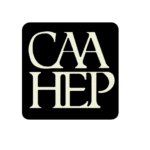
Caldwell University has been approved by NBCC as an Approved Continuing Education Provider, ACEP No. 4598. CE Programs that do not qualify for NBCC credit are clearly identified. Caldwell University is solely responsible for all aspects of the programs.






